If you’re currently using (or considering) Amped and wondering if there’s a better option to supercharge your email capture, you’re in the right place.
Here’s what we’ll cover:
• The top Amped alternatives and their standout features.
• Key benefits and pricing options for each tool.
• Which platform works best for your business type and needs.
Since we have a horse in this race, we made sure to do the homework. We've analyzed thousands of real user reviews across G2, Capterra, Reddit, and beyond to lay out where each popup design tool genuinely shines - and falls short.
Ready? Let’s go.
TL;DR: Amped alternatives at a glance
Note: The features, pricing, and details mentioned for each product are as of January 2026, and may have changed since then.
Where Amped falls short, according to reviewers
While Amped served many businesses well during its prime, several recurring user complaints have become hard to ignore.
After analyzing feedback from customers who switched away from Amped, here were the most common issues that kept coming up:
- Acquisition disruption – Mailchimp's acquisition of Amped left users scrambling for alternatives with minimal transition support.
- Mailchimp-only direction – Amped was acquired by Intuit Mailchimp; its popup tech now lives inside Mailchimp, so access runs through Mailchimp accounts.
- Vendor lock-in risk – Users need to move to Mailchimp to keep using Amped popups, creating friction for teams on other ESP/SMS tools.
- Support responsiveness – Some reviews mention being routed to calls for simple questions and not receiving timely follow-ups via email.
1) Alia - The #1 Amped Alternative in the Market Right Now

Alia stands out as the most sophisticated popup platform we've tested, specifically built for Shopify stores that demand exceptional performance.
Unlike generic popup builders, Alia combines AI-powered optimization with brand storytelling capabilities that turn casual visitors into engaged customers through educational, multi-step experiences.
Here are the top reasons users cite when leaving Amped, and how Alia compares:
Key Features:
- AI-powered A/B testing automatically generates and tests popup variants, choosing winners without manual input - significantly outperforming static Amped popups
- Brand storytelling popups reward users for engaging with educational content, unlike Amped's basic discount-only approach
- Smart triggering system learns from traffic patterns to optimize display timing, addressing Amped's poor landing page performance
- Zero-party data collection through quizzes and surveys enables advanced segmentation that Amped couldn't provide
- Shopify-first integration ensures native UX and performance optimization without slowing site speed
Alia offers a 14-day free trial, and then starts at $100/mo
Alia uses simple, flat monthly pricing tied to site traffic—no auto-upgrades, month-to-month, cancel anytime. Every plan includes all features and white-glove onboarding, with a free trial to start.
What else can you do with Alia?
Beyond replacing Amped's basic functionality, Alia transforms your entire customer acquisition strategy.
The platform's educational popup format allows brands to tell their story, explain product benefits, and collect valuable customer insights before the purchase decision.
Read next: We Compared Alia Alternatives - Here's #1
2) Wisepops - Multi-Channel Engagement Beyond Basic Popups

Wisepops positions itself as a comprehensive website engagement platform that goes far beyond traditional popups.
The platform offers a unified approach with popups, web push notifications, notification feeds, and in-page embeds all working together to maximize conversions.
Key Features:
- Multi-channel messaging — Popups, onsite Notification Feed, embedded sections, and Web Push in one platform.
- AI product recommendations — Serve personalized products in popups, embeds, and the feed; track impact with built-in reporting.
- Experiments with control groups — Run A/B/n tests (including holdout/control) to measure true incremental lift.
- Real-time personalization — Dynamic content and custom properties adapt offers to each visitor’s live session and behavior.
- Deep integrations — Native connections with Shopify, Klaviyo, Segment, Google Analytics, and more; Zapier extends workflows across your stack.
Wisepops offers a 14-day free trial, pricing starts at $49/mo
Considerations before going with Wisepops:
- Essential plan limited to 2 websites and basic support
- Advanced AI and dedicated support require custom pricing
- Deep customization needs some technical knowledge
More:
- Read our in-depth buyer guide: Alia or Wisepops?
- We Reviewed 12 Top Wisepops Alternatives - Here's #1
3) OptiMonk - Revenue-Focused Popup Optimization

OptiMonk differentiates itself through industry-leading popup load speeds and comprehensive revenue tracking.
The platform focuses on true sales lift measurement and offers advanced personalization features that adapt to different audience segments within the same campaign.
Key Features:
- CDN-optimized loading — Global CDN delivers lightning-fast popup load times and improves overall site performance.
- Revenue-focused analytics — Measure true revenue uplift with order/AOV tracking and custom conversion goals to optimize for sales, not vanity metrics.
- Smart product recommendations — Dynamically suggest items based on browsing and cart contents.
- Auto-apply discounts — Auto-redeem discount codes at checkout; generate unique codes (incl. Shopify auto-sync) and display them in on-site messages.
- Ready-made templates & use cases — Tactic library covers common scenarios like cart abandonment and seasonal/holiday offers for quick launches.
OptiMonk offers a free plan with 10,000 monthly pageview limit for one domain
Considerations before going with OptiMonk:
- Strong popup optimization but limited broader marketing automation
- No built-in web push or notification feed features
- Enterprise pricing via sales only, which can slow implementation
More:
4) WooHoo - Gamified Popup Experiences That Drive Engagement

WooHoo takes a completely different approach by turning email capture into interactive games.
The platform’s gamification strategy has proven to increase subscriber list growth by up to 400% by making the opt-in process engaging and rewarding rather than transactional.
Key Features:
- Interactive game formats — Wheel of Coupons, Card Dance, Pick A Gift, and Reel of Coupons keep sign-up experiences fun and engaging.
- Psychology-driven win mechanics — Configure prize odds so visitors feel they’re winning discounts instead of passively receiving them.
- Fraud protection — Safeguards around dynamic coupons and entries help prevent abuse of gamified discounts
- Mobile-responsive popups — Widgets are mobile-ready and adapt to small screens to meet Google guidelines.
- Built-in autoresponder — Automatically send coupon emails after subscription or route contacts to your ESP.
WooHoo offers a 7-day free trial and no credit card required, pricing starts at $29/mo
Considerations before going with WooHoo:
- Gamified email popups only, lacks broader marketing automation
- Impression limits can constrain larger/high-traffic sites
- No explicit SMS capture functionality
- Requires embedding code snippets, may need technical familiarity
Read more: WooHoo Alternatives That Include SMS Capture
5) Poptin - Agency-Friendly Popup Builder with Extensive Integrations
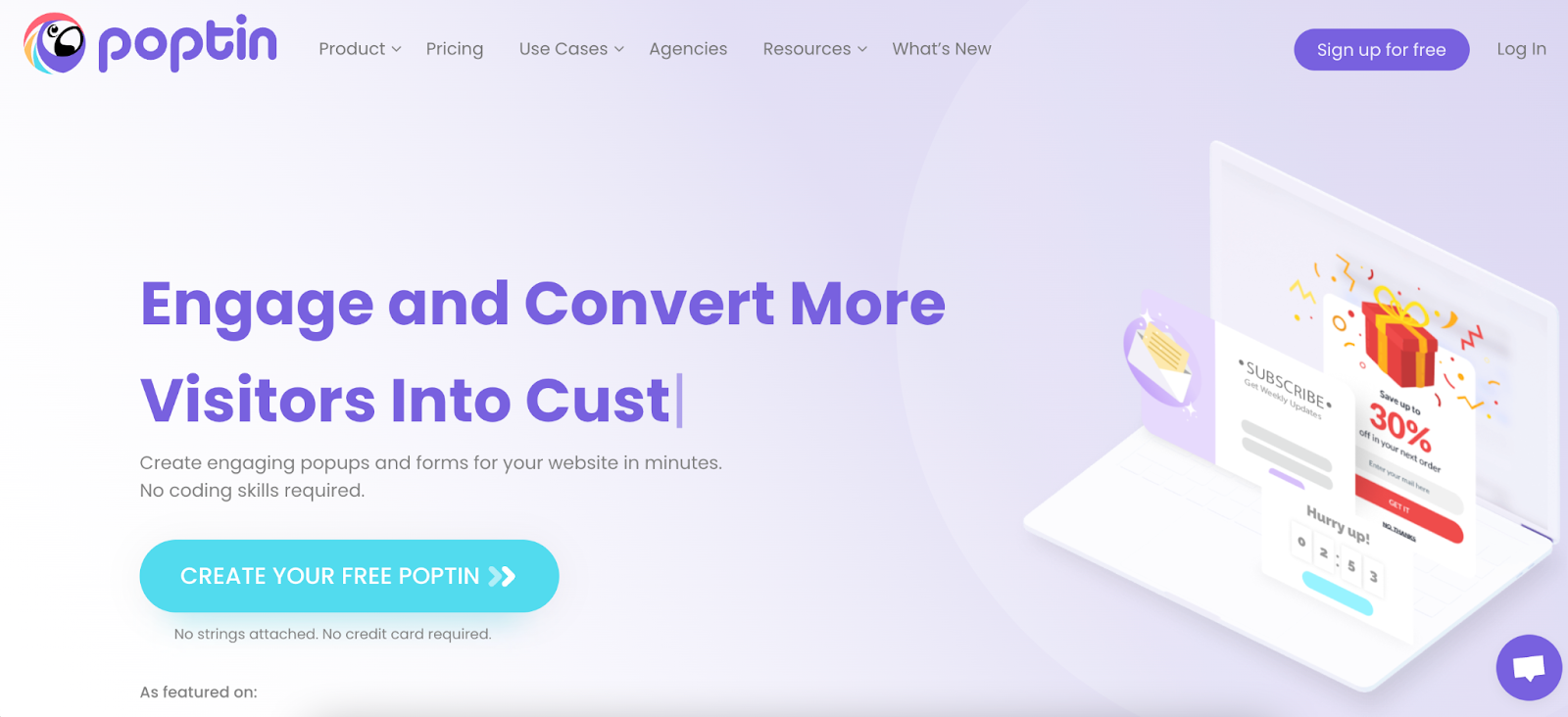
Poptin caters to agencies and marketers managing multiple client accounts, streamlining campaign setup across many sites.
With 1,500+ app connections via Zapier and Integromat, it supports robust data sync and automated workflows for complex stacks.
Key Features:
- Wide integrations — Connect via Zapier and Make (formerly Integromat) alongside dozens of native connectors to sync leads and automate workflows.
- Agency-friendly plan — The Agency tier supports unlimited domains for managing many client sites; pricing scales by monthly visitors.
- Advanced targeting — Triggers include exit-intent, time delay, page-scroll, on-click, and geo-location for precise delivery.
- Built-in autoresponders — Automatically send welcome/thank-you emails (and coupon codes) after a form or popup submission.
- Gamified & urgency elements — Create Spin-the-Wheel, Pick-a-Gift, and Scratch-card popups, and add countdown timers to drive action.
Poptin offers a free plan with basic features, pricing starts at $25/mo
Considerations before going with Poptin:
- Free plan capped at 1,000 monthly visitors, which can restrict growth
- Platform focuses on popups/forms and email autoresponders and no native SMS sending is listed
- No advanced AI personalization features are advertised on the official features page
More:
6) Justuno - Enterprise-Grade Marketing Automation Platform
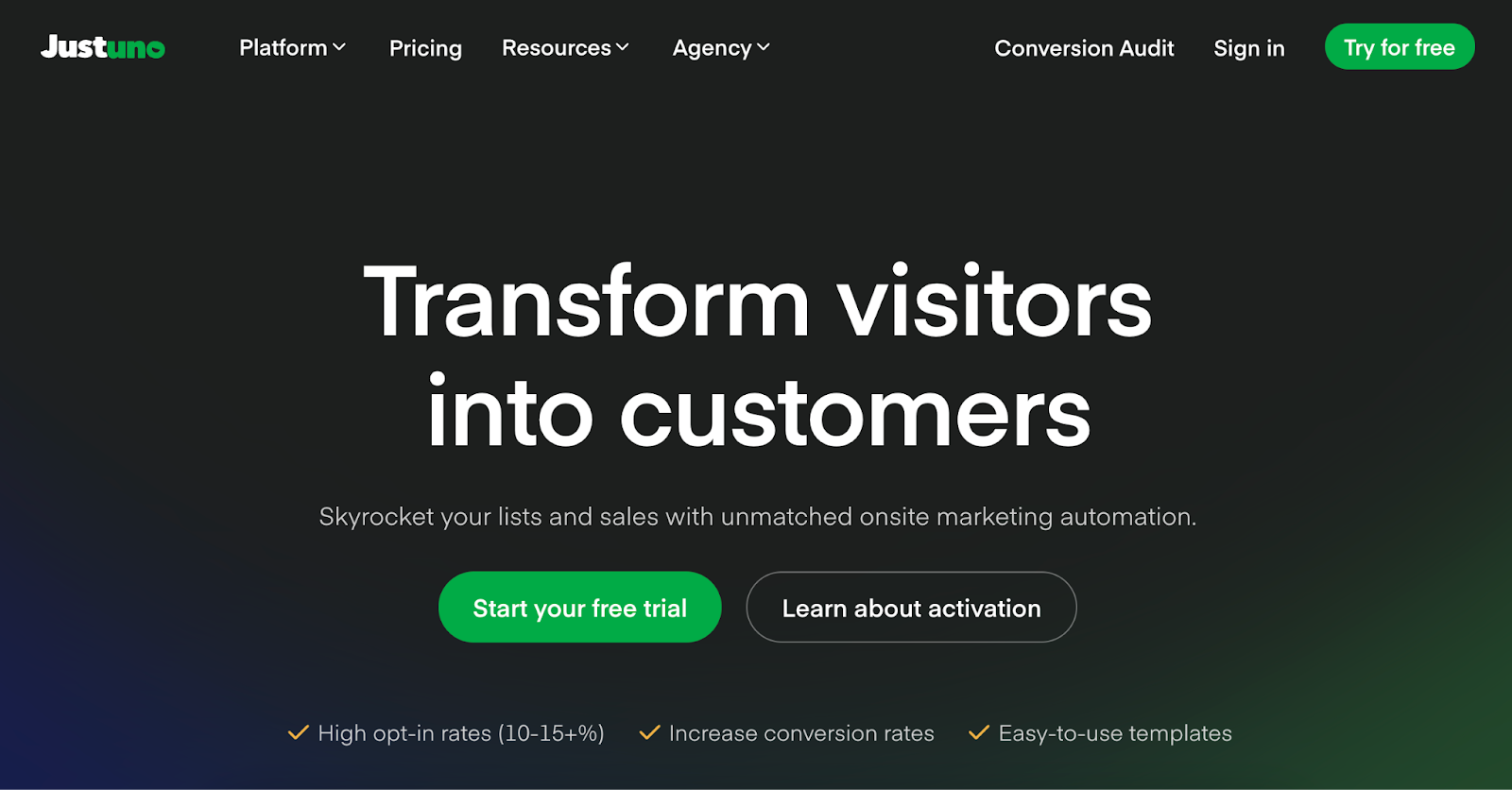
Justuno goes beyond simple popup creation to offer a comprehensive onsite marketing automation platform.
The platform provides sophisticated workflow builders, AI product recommendations, and real-time visitor segmentation for complex customer journeys.
Key Features:
- Workflow automation — Visual builder for multi-step onsite journeys that adapt to behavior (delays, branching, multivariate tests).
- AI product recommendations — Automated upsell/cross-sell engine (“Commerce AI”) to lift AOV and conversion.
- Real-time segmentation — Target by live behavior and traits (including geo rules) for dynamic, personalized messaging.
- Email & SMS verification — Reduce fake signups with real-time validation and typo/phone checks.
- Enterprise controls — Custom roles/permissions, team management, and cross-domain reporting for large orgs.
Justuno offers a 14-day free trial and free plan, pricing starts at $39/mo
Considerations before going with Justuno:
- Free plan limited to 2,000 monthly unique visitors, which can restrict growth, and enterprise-level capabilities are only available via custom pricing/sales
- Platform depth can mean a learning curve for full utilization
More:
7) Popupsmart - AI-Powered Popup Creation from Text Prompts

Popupsmart’s AI-powered builder turns simple text prompts into fully designed, ready-to-publish popups—cutting the time and expertise normally needed to launch effective campaigns.
Key Features:
- AI popup generation — Create fully designed, ready-to-publish popups from a single text prompt—no code needed.
- 500+ responsive templates — Launch faster with a large library of professionally designed templates for common ecommerce use cases.
- Advanced targeting — Show the right message with exit-intent, scroll-depth, traffic-source/UTM, and geo-location rules.
- CRM & analytics integrations — Connect to tools like HubSpot/Klaviyo and GA4; run A/B tests and track performance to optimize with your own data.
- Multi-site & team management — Add teammates and manage many clients/sites from a centralized agency dashboard with roles and permissions.
Popupsmart offers a free plan with pageview-based pricing, pricing starts at $39/mo
Considerations before going with Popupsmart:
- Visitor-based limits can restrict growth on lower tiers
- Advanced features and team controls sit on higher-priced plans
- Matching brand voice still needs manual tuning despite powerful tooling
- No native SMS sending; relies on integrations with SMS provider
Read more: We Compared Popupsmart Alternatives - Here's #1
8) Hello Bar - Trusted Popup Solution for Quick Deployment

Hello Bar has earned trust from over 600,000 websites worldwide through its focus on quick setup, ease of use, and strong ROI.
The platform offers hundreds of customizable templates tailored to various industries and use cases.
Key Features:
- Trusted at scale — Used by 600,000+ websites across media, ecommerce, and professional services.
- Template library — Customizable, responsive popup designs to match brand and layout needs.
- Inline CTAs — Insert native-looking calls-to-action inside blog posts and articles to drive engagement without disrupting reading flow.
- GDPR readiness — Documentation and policies to help teams meet privacy requirements for EU users.
- Zapier + automation — Connect Hello Bar to thousands of apps through Zapier; additional automation options via Integrately and Webhooks.
Hello Bar offers a free plan for up to 5,000 views, pricing starts at $39/mo
Considerations before going with Hello Bar:
- View limits tied to plans can restrict high-traffic sites and overage fees apply
- No native SMS marketing or multichannel automation explicitly listed on the features pages
- Custom/enterprise needs require contacting Hello Bar for a tailored plan
9) Sleeknote - Multi-Goal Campaign Management Platform
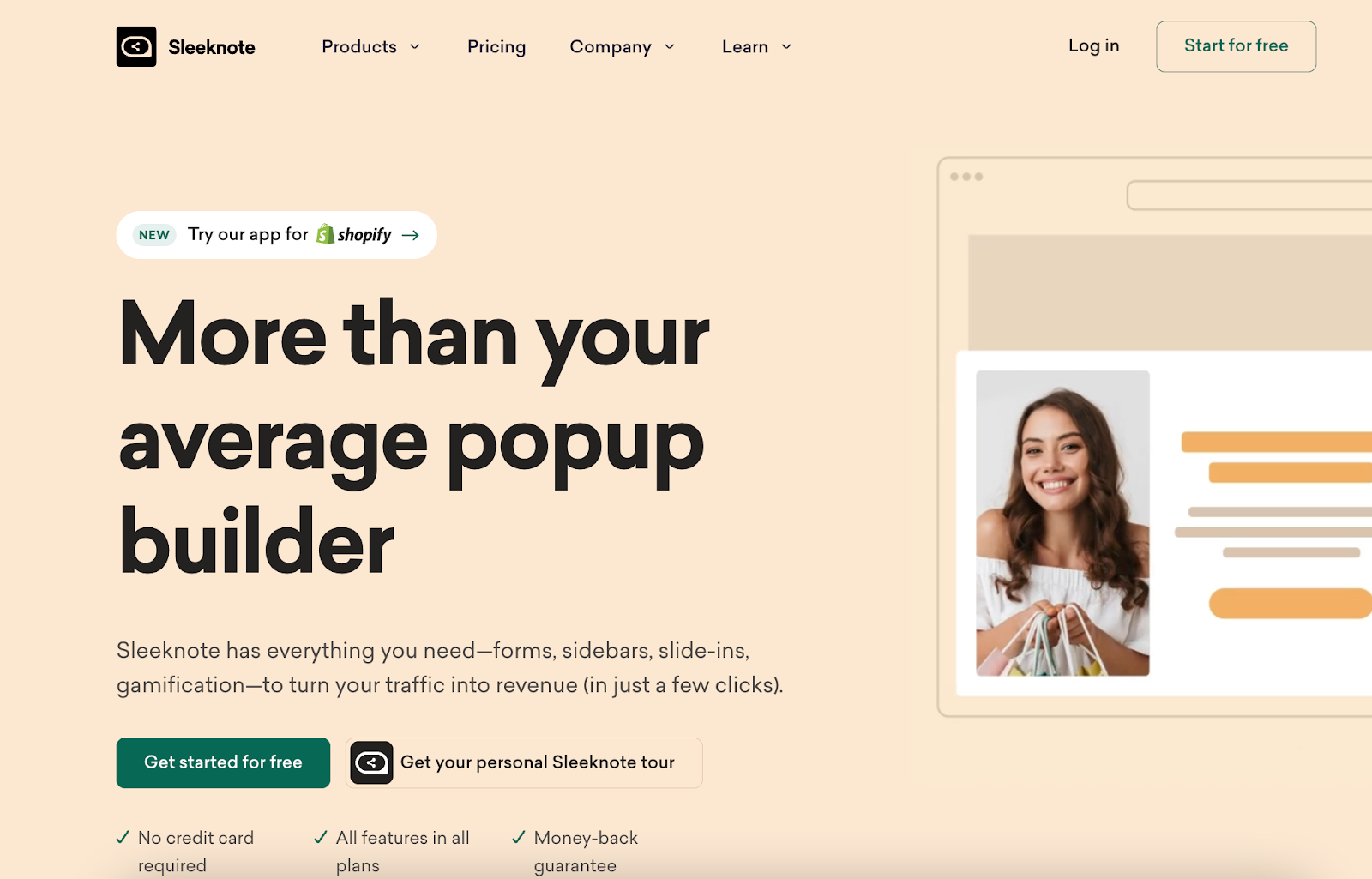
Sleeknote lets you run multiple personalized popup campaigns at once for different visitor segments and objectives.
The platform supports behavior-based targeting across unlimited domains for more sophisticated, tailored experiences.
Key Features:
- Multi-campaign personalization — Run many concurrent, segmented campaigns tailored to different goals and audiences.
- 1,200+ integrations — Extensive, regularly updated connections across ESP, CRM, ecommerce, and more.
- Built-in gamification — Spin-to-Win, Scratch-to-Win, Seasonal Calendar, and Daily Offers to boost engagement and capture more sign-ups.
- Device-specific editing — Create desktop and mobile versions together and edit each separately for optimal UX.
- Unlimited scale — Unlimited campaigns and unlimited domains on all plans; pricing is based on monthly sessions.
Sleeknote offers a 14-day free trial, pricing starts at $55/mo
Considerations before going with Sleeknote:
- Pricing shown in EUR, potential currency swings for non-EU customers
- Visitor/session limits per tier can restrict larger sites without upgrades
- Gamification available only on higher-priced plans
- No native SMS sending stated; relies on integrations for SMS
Read more: Sleeknote Alternatives (Ranked)
10) Privy - Shopify-Focused Email and SMS Marketing Platform
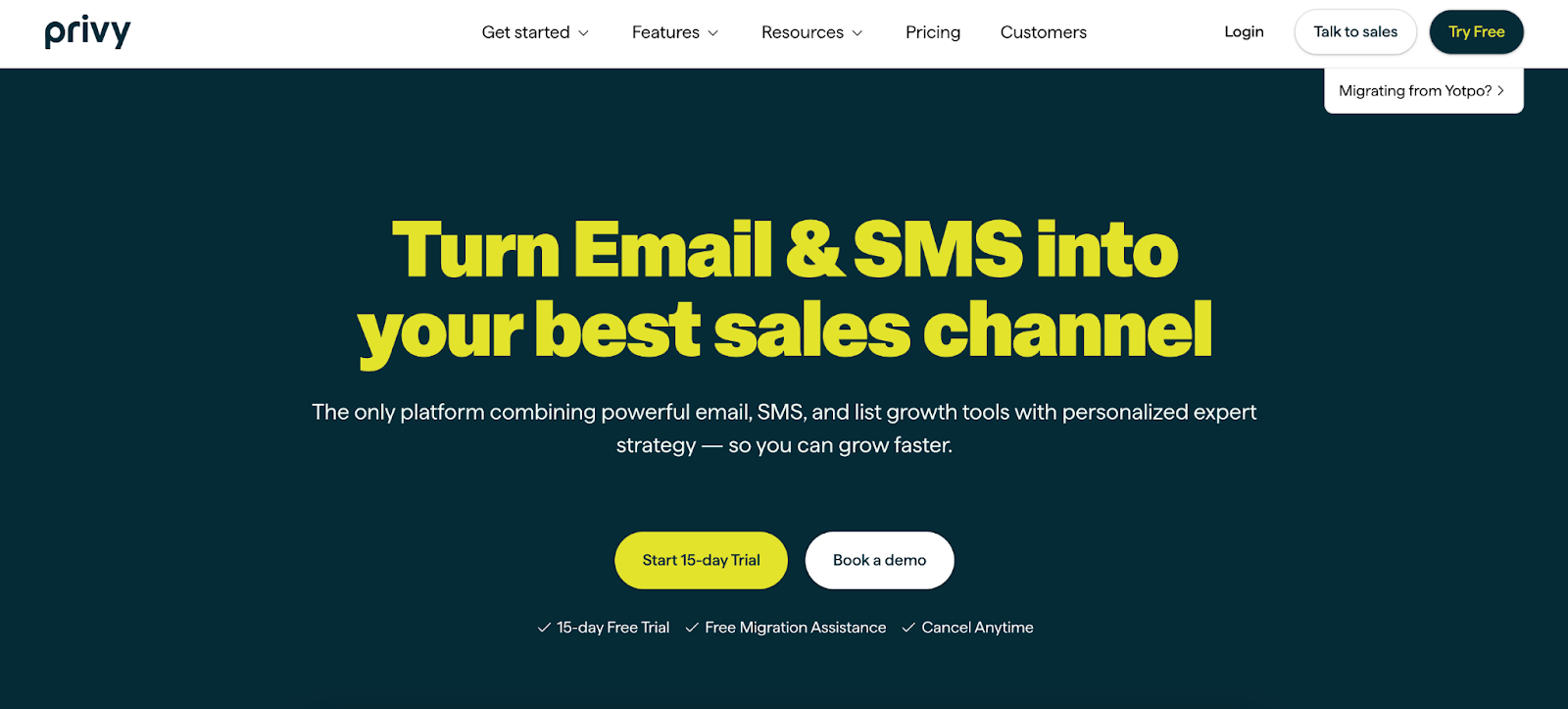
Privy specifically targets Shopify merchants with deep platform integration and dedicated coaching support.
The platform combines popup creation with comprehensive email and SMS marketing automation designed for ecommerce success.
Key Features:
- Dedicated coaching & success — 1:1 ecommerce strategists and a Dedicated Customer Success team provide hands-on guidance, with live chat and email support.
- Dual email + SMS capture — Multi-step popup forms collect both email and phone in one flow to maximize list growth for each visit.
- Deep Shopify integration — One-click install, automatic contact sync to Shopify, and seamless coupon/product syncing tie opt-ins to checkout data.
- Gamified popups — Spin-to-Win and other interactive displays boost engagement and conversions.
- Lifecycle automations — Prebuilt flows (welcome, cart recovery, post-purchase) with an intuitive builder help engage customers across their journey.
Privy offers a 15-day trial, pricing starts at $30/mo that scales with contact list size
Considerations before going with Privy:
- SMS sending supported for the US and Canada only
- Pricing scales with mailable contacts, costs rise as your list grows
- Built primarily for Shopify stores, with deep native integration
More:
11) Picreel - Enterprise Popup Solution with 24/7 Support

Picreel is an enterprise-grade popup platform used by brands such as Virgin, Forbes, and Tag Heuer.
The platform offers 700+ integrations and 24/7 support, giving you broad connectivity and round-the-clock help for complex stacks.
Key Features:
- 700+ app connections — Integrate via Zapier to route leads into hundreds of CRMs, ESPs, ecommerce tools, and more; plus native and webhook options.
- 24/7 support — Get help anytime by phone, chat, or email; plans also mention dedicated account managers.
- Enterprise-ready — Real-time data sync to your stack (including API/webhooks), custom integrations, and personalized account management.
- Advanced targeting — Show offers by referral source, page/content rules, time on site, device type, and visitor status (new vs. returning).
- Fast, copy-paste install — Add a lightweight snippet and start launching campaigns in seconds—no coding required.
Picreel offers a 30-day free trial, with free plan for startups, pricing starts at $19.99/mo
Considerations before going with Picreel:
- Pricing may increase steeply for high-traffic websites, and advanced features are reserved for paid plans.
- Shopify app experience is currently limited pending updates.
- Users needing highly customized campaigns may face a learning curve
Read next: We Compared Picreel Alternatives - Here's #1
12) BDOW (formerly Sumo) - Multi-Site Management for Agencies
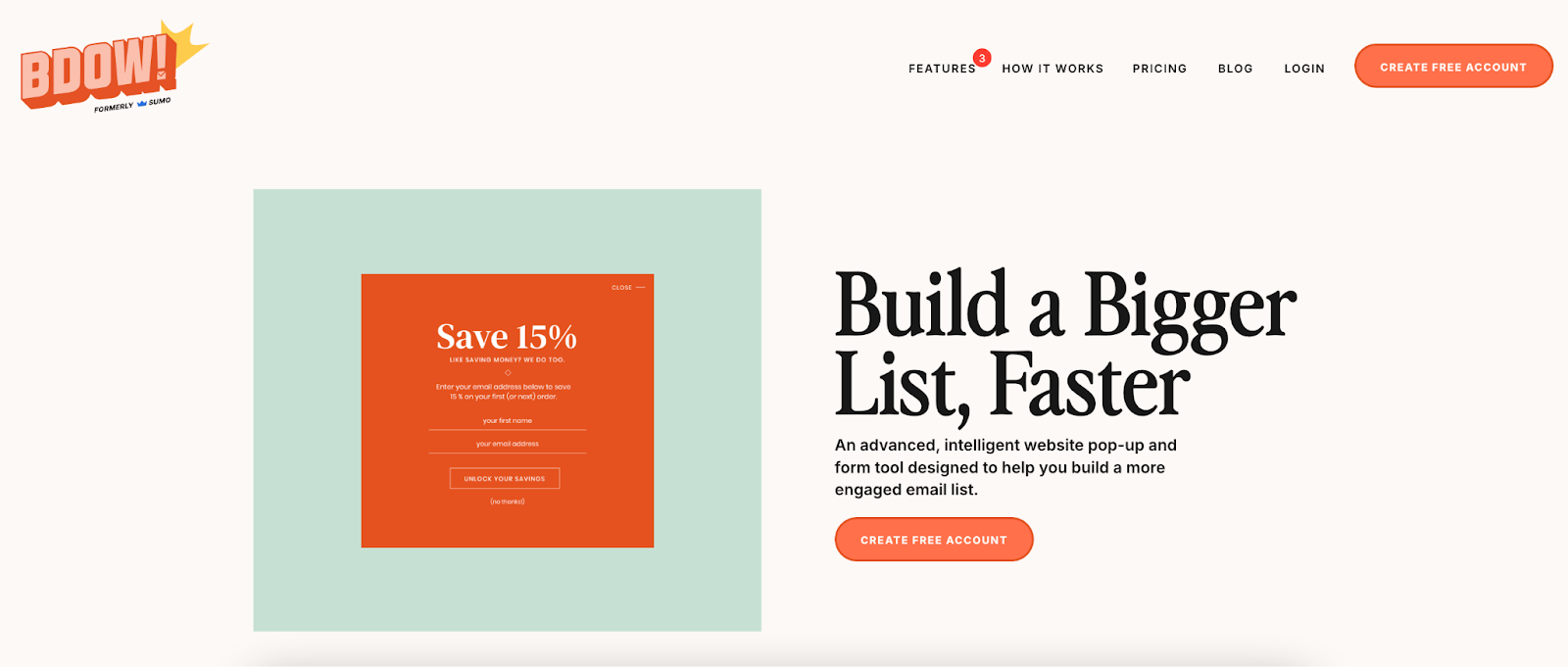
BDOW (formerly Sumo) serves over 30,000 active websites with a focus on multi-site management and agency needs.
The platform provides centralized dashboard management for multiple client accounts and websites.
Key Features:
- Multi-site management — Manage many client sites from a single dashboard with user controls and easy add/remove.
- Built-in email marketing — Send with the native autoresponder and broadcasts directly from BDOW.
- Advanced targeting — Display by URL, page, device, referrer, visitor status, and exit-intent for precise delivery.
- Revenue tracking — Dashboard surfaces email metrics and ecommerce revenue when connected to Shopify/WooCommerce.
- Flexible integrations — Connect natively and via Zapier to thousands of CRMs, ESPs, and ecommerce apps.
BDOW offers a free plan, pricing starts at $15/mo
Considerations before going with BDOW:
- Monthly and yearly billing available, not annual-only
- Email send limits tied to plan, and higher tiers raise monthly email allotments
- Free version is limited to 1 site; multi-site available on paid plans with agency/dashboard controls
Read more: BDOW Alternatives That Offer Monthly Billing
13) Klaviyo - Email Marketing Platform with Popup Capabilities

Klaviyo approaches popups from an email marketing perspective, offering web forms as part of a comprehensive customer data platform.
The platform integrates popup creation with deep ecommerce analytics and customer lifetime value tracking.
Key Features:
- Deep ecommerce data — Connect sign-up forms to real purchase history and CLV metrics; Shopify events sync in near real-time and CLV (historic + predicted) is built into profiles.
- AI form timing — Klaviyo AI tests display timing and shows forms at optimal moments; standard triggers include time on page, scroll depth, and exit intent.
- Revenue attribution for forms — See sales driven by each form with dedicated “Total revenue” and attribution reporting in the Sign-up forms dashboard.
- Shop Pay lead capture — Prefill Shop users’ phone numbers to streamline SMS opt-in and reduce friction during signup on Shopify stores.
- 350+ integrations — Built-in connections across ecommerce and marketing tools to unify your stack and activate data.
Klaviyo offers a free plan, pricing starts at $45/mo
Considerations before going with Klaviyo:
- Platform centers on email and SMS, and popups are built-in sign-up forms rather than a dedicated popup suite
- Pricing scales with active profiles and separate SMS credits, adding complexity as lists and regions grow
- Advanced segmentation and AI are available but require user familiarity to get full value
Read more: Klaviyo Alternatives (Ranked)
The Verdict: Which Amped Alternative Should You Choose? (Our Top 3 Picks)
- Alia - The clear winner for Shopify stores seeking maximum performance. With AI-powered A/B testing, brand storytelling capabilities, and proven results, Alia addresses every limitation that frustrated Amped users. The platform's Shopify-first approach and white-glove onboarding make it the obvious choice for serious ecommerce brands.
- OptiMonk - Best for businesses prioritizing speed and revenue tracking. The CDN-optimized loading and comprehensive A/B testing make it ideal for high-traffic sites that need reliable performance without the complexity of enterprise platforms.
- Wisepops - Perfect for brands wanting multi-channel engagement beyond basic popups. The unified platform approach with web push notifications and feeds provides comprehensive visitor engagement that goes well beyond what Amped offered.
The transition away from Amped doesn't have to be disruptive. A case study: How JOI Switched from Amped and Increased Sign-Ups +36% and Purchases by +21% shows exactly how brands can not only replace Amped's functionality but dramatically improve their results in the process.







.png)
.png)





.webp)














































.webp)